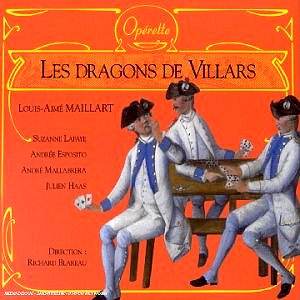This
realisation by Max de Rieux is an interesting
component in this series, principally
because it is one of the earliest examples
of the genre. It also fascinates because
it was composed by a competent musician,
now almost forgotten and not mentioned
in the usual operetta books. The overture
also appears in a modern recording (2000)
by the BBC Phil on a concert CD 'French
Bonbons' (CHAN 9765) with three other
rarities and an odd mix of other pieces.
One popular aria 'Ne parle pas'
is available in two 1930s recordings.
Apart from this there are no other entries
of Maillard's music in the CD catalogue.
The
CD notes of Jean Ziegler tell us that
Louis-Aimé Maillard was born
at Montpellier, France, the son of a
provincial actor who founded an artistic
agency, and an actor brother. Maillard
was a talented yet lazy student who
at sixteen entered the Paris Conservatoire
where he learnt composition under Halévy.
He won the Grand Prize of Rome for writing
a cantata, Lionel Foscari and
spent two years in Rome before returning
to Paris. His first opera, Gastibelza
was a great success and opened the doors
to the Opéra-Comique Théâtre
where two other works appeared and preceded
Les Dragons de Villars. This
is the only work for which he is now
remembered.
The
librettist, Cormon, had delivered good
books for Maillard's previous operas
and here with Lockroy delivers an unusual
plot. The opera takes place in a farm
courtyard and at a mountain pass.
A
substantial overture (5 mins) is as
lovely as those popular overtures, Zampa
and Merry Wives of Windsor. Its
novel opening with dramatic staccato
chords moves seamlessly into an elegant
pizzicato passage, later to be interrupted
by good rhythmic material and a fanfare
section that carries more than a passing
likeness to the Entrance of the Peers
(Iolanthe).
The
opera opens with the villagers picking
fruit at the farm of Thibault, a rich
farmer. A corps of dragoons is soon
spotted approaching the village. Knowing
their dubious reputation Thibault, with
his wife Georgette, decides to lock
up the farm girls in their spacious
dovecote. Tambourines and trumpet announce
the colourful arrival of the soldiers
with their officer Belamy in charge.
The absence of women and wives takes
them by surprise, but then Rose Friquet,
with mules, appears. Friquet’s introductory
aria has a touch of Tchaikovsky about
it. With a reputation as a witch Friquet
finds that a group of Protestant fugitives
are hiding close by in the mountain
and tells Sylvain, Thibault's farmhand
about the help they need. Between them
they work out a stratagem that involves
the tolling of a bell from nearby monastic
settlement to help the fugitives cross
the border to safety. The soldiers are
plied with wine and fruit to help them
forget the absence of women. In Act
II, Rose and Sylvain are found in the
mountains where they develop their love
affair. She is later proved innocent
of her sorcery and they marry in Act
III.
Susanne
Lafaye as Rose has a strong voice with
pleasant timbre and in her opening aria
effortlessly handles a wide vocal range.
Andrée Esposito as Georgette
makes the most of her small part and
has a warm low register. The officer,
Belamy (Julien Haas) is ideal for the
part with his robust, resonant voice
and comes across with the determination
fitting his role. André Mallabrera
as Sylvain handles his romance (CD1
tk.8) with good emotion and has a timbre
well fitting the breezy phrases of a
simplistic tune. His 'Proscrits, c'est
l'esperance' (CD2 tk.1) is sung with
engaging innocence and his strong vibrato
does not mask his sensitivity to the
aria. Pierre Heral as the farmer, Thibault,
provides strong support throughout.
Under Blareau's direction the music
breathes life and sounds well with the
large orchestral forces.
I
liked my first hearing of this composer
and felt that it is such a pity so little
of his music is known. He is inventive
with colour, and from the evidence here
incorporates lush harmony, catchy rhythms
and novel decorative phrases. If you
like Offenbach, Lecocq, or Sullivan
you'll enjoy this music. In the Act
I finale (CD1 tk.13) I clearly detected
a section that might have been lifted
wholesale from one of the Auber operas
written twenty years earlier. I also
wonder whether Sullivan studied Maillard's
material when he was in Paris in Spring
1882, just before he commenced writing
for Iolanthe.
The
clear recording is more than a studio
version of a stage performance for it
successfully attempts to take you into
the farmyard with realistic sounds of
hens, mules and birds like a radio play.
The second CD opens with mountainous
atmospherics, which may be mistaken
for track noise or a bad transfer. Why
it disappears at the commencement of
track 3 (whilst still in the mountains)
is a mystery.
This
CD set, like the Petit Duc, is
a rare find. Brief
notes in French are provided in an attractive
card case that matches the rest of the
series. The illustration of dragoons
certainly gives no indication of the
effervescent nature of the contents.
Raymond Walker
Operette
series from Universal Accord reviewed
by Ray Walker
